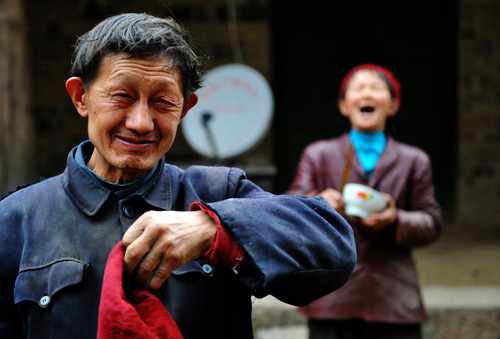|
 |
|
TOGETHER FOREVER: Zheng Tingyun, a farmer in Caochuanzi Village in Hanzhong City, Shaanxi Province, and his wife have spent years getting used to an empty-nest life after their four children moved away from home (LIU XIAO) |
Mid-Autumn Festival is traditionally a time for family reunions in China. But for 53-year-old Beijing resident Wei Xiling and her husband, this year's festival on September 30 was the fourth in a row they spent without their daughter at home. Four years ago, Wei's daughter went to the United States for further study and is still working on her doctoral degree.
"We really envy those families with kids back home," Wei said. "But we can only see our daughter once a year at the Spring Festival." The Spring Festival is the largest celebratory event in China that falls on the first day of the first lunar month, usually between January and February.
Wei and her husband talk with their daughter twice a week online and each conversation is similar—"How are your studies?" "How are the meals?" "How is the weather over there?" "We don't have a lot to say normally, and we just want to make sure she is safe and healthy," Wei said.
Wei also worries about the future. "My daughter doesn't plan on coming back to China, and we don't want to go to the United States," Wei said. "I kind of worry about who is going to take care of us when we get older."
Wei is not alone in her worry. Her neighbor's son went to the United Kingdom in the 1980s for further study and stayed permanently for work. "He didn't even come back home for his father's funeral. It is scary, but at least the family has four kids, whereas we have only one," Wei said.
Growing phenomenon
There are a growing number of parents in China like Wei and her husband. With a single child moving away from home to go to college or overseas for further study, parents are suddenly at a loss for what to do.
Yan Qingchun, Deputy Director of China National Committee on Aging, revealed that 49.7 percent of urban Chinese households are emptynest families.
According to Yan, most empty nesters in China used to be people aged 60 to 80. But the country's high enrollment rate of young people in higher education over the last decade means that a growing number of people between 40 and 60 are now empty nesters. China's family planning policy since the late 1970s means that most urban couples in this age range are allowed to have only one child.
Li Xiaozhou, a 48-year-old resident in Nanjing, capital city of eastern Jiangsu Province, is a new empty nester after his daughter went to a university in Beijing in September.
"Our daughter used to be the center of our family," Li said. "Now that she's gone, my wife and I watch TV without even paying attention to what's on. Without the TV, the room is too quiet for us."
"We both know we should have our own lives now since we've been working for our daughter for so long, but we don't know how to live our own lives," said Li's wife Yu Zhihong.
Li's daughter, Shiyu, has a different feeling. "I enjoy my life at the university a lot, but the endless text messages from my mom are kind of annoying," she said, adding that her mother sends daily messages to her from 7 a.m. until the late night.
"If I don't reply, my mom will call me. It's like being monitored every day," Li Siyu said. "There was one time when I told them I was lying in bed with a stomach ache, and the next day, my mom showed up in my dormitory because she was so worried about me."
Shiyu hopes her parents will adjust to the life without her soon. "Otherwise, if I go abroad in the future or stay in Beijing for my career, I don't know how they will deal with it," she said.
| 